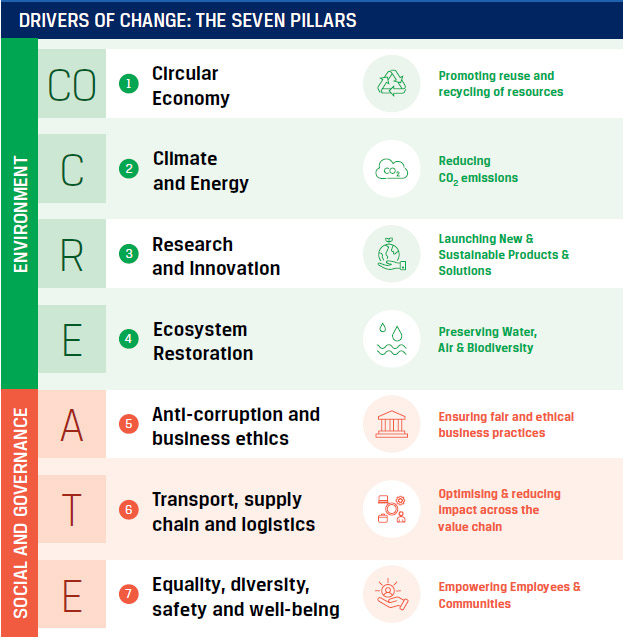Our Strategy
Our sustainable development strategy is guided by our “CO-CREATE” framework. This
framework consists
of seven strategic pillars which are derived based on the JSW Group’s sustainability focus areas,
our own materiality assessment and the sector-specific issues we have identified as shown below:

- Circular Economy: We aim to increase the use of waste derived resources
throughout
our
manufacturing processes. In order to achieve this, we intend to increase the use of alternate
raw materials in clinker production. Further, by utilising more industrial waste as alternate
fuel sources, we aim to increase our thermal substitution rate. To achieve this, we are sourcing
new waste streams and upgrading our alternate fuel handling systems to reduce reliance on fossil
fuels across our plants. Furthermore, as we co-process more plastic waste than we consume for
packaging, our aim is to become significantly plastic negative by Fiscal 2026.
- Climate and Energy: Our primary goal under this pillar is to lower our
carbon dioxide
emission intensity. We have committed to reduce our net carbon dioxide emission intensity by
15.00% from 262.00 kg of carbon dioxide per tonne of cementitious material in Fiscal 2021 to
223.00 kg of carbon dioxide per tonne of cementitious material by Fiscal 2026. As part of
this pillar, we aim to progressively integrate higher proportion of solar power plants into
our power mix and install WHRS in all our kilns. To further underscore our commitment to
this pillar, we have also signed up to the United Nations Energy Compact and the Global
Framework Principles for Decarbonising Heavy Industry. Additionally, as members of the
Global Cement and Concrete Association (“GCCA”), we are steadfast in adhering to GCCA’s
roadmap to attain net zero concrete by 2050.
- Research and Innovation: We aim to harness our research and innovation
capabilities
to
introduce new sustainable products and solutions. Additionally, we target to publish EPDs for
all our existing and new products by FY 2026.
- Ecosystem Restoration: We are committed to reducing the specific freshwater
intensity
of
our products. Additionally, we plan to conduct biodiversity assessments and implement
biodiversity management plans across all the mines we operate that are determined to be of high
biodiversity
importance. Moreover, as part of our zero landfilling efforts, we aim to divert a majority of
all our waste away from landfills.
- Anti-corruption and Business Ethics: As part of this pillar, we will
continue to
provide code of
conduct and human rights training to all our employees and continue conducting human rights
assessments. Furthermore, we will continue to ensure that all our plant sites and mines adhere
to applicable human rights laws and regulations.
- Transport, Supply Chain and Logistics: We aim to ensure that a majority of
our
transportation vehicles are electric by FY 2026, aligning with our commitment to the Climate
Group’s “Electric Vehicle 100” goal. Additionally, we plan to conduct ESG assessments of our
critical suppliers to ensure their alignment with our ESG goals and strategies.
- Equality, Diversity, Safety, and Well-being: We aim to empower our
employees and
communities
by increasing the number of beneficiaries of our corporate social responsibility (“CSR”)
efforts. Moreover, we aim to ensure zero-fatality across our operations and enhance gender
diversity across our operations.
To further underscore our commitment to this pillar, we have also signed up to the United Nations
Energy Compact and the Global Framework Principles for Decarbonising Heavy Industry. Additionally,
as members of the Global Cement and Concrete Association (“GCCA”), we are steadfast in adhering to
GCCA’s roadmap to attain net zero concrete by 2050.











